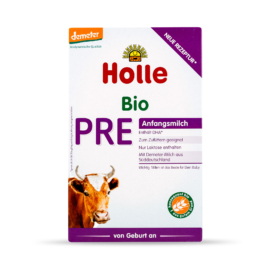




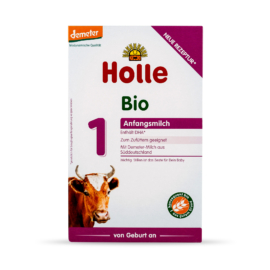

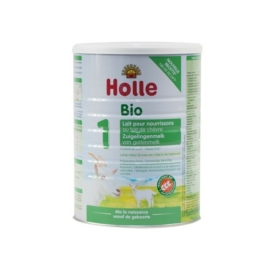

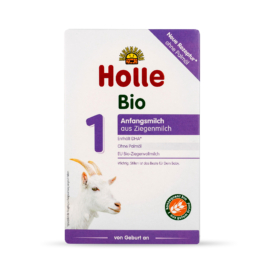

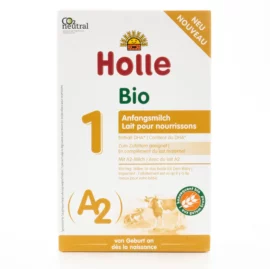

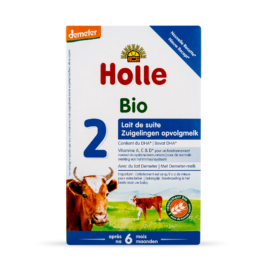

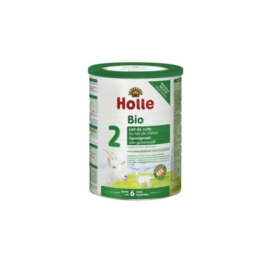

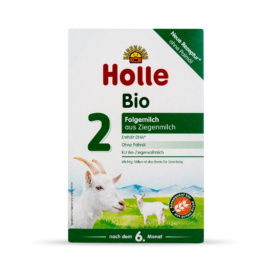

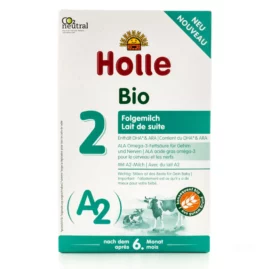

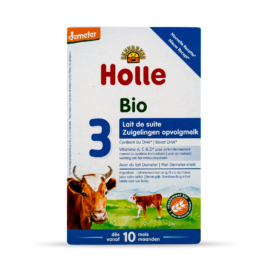

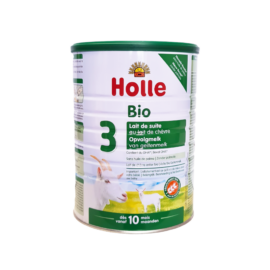

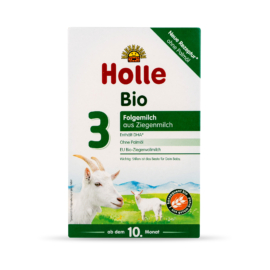

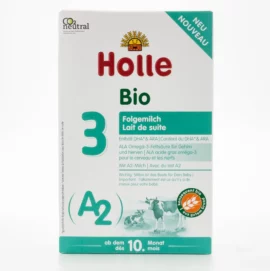

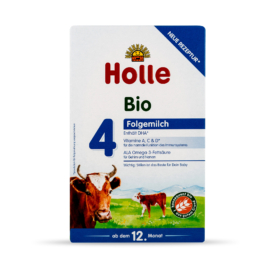

When looking for high quality, organic baby formula, Holle is one of the most reputable brands available. On the market for over 80 years and feeding babies in over 40 different countries, the Holle brand is meticulous about its farming and manufacturing practices, producing a product you can trust for your baby.
Holle is a Swiss organic infant formula company founded in 1934. Since then it has become one of the leading global manufacturers of organic, natural baby food and formulas.
Holle’s original product was organic baby formula, but it now offers over 80 different products. Holle’s carries a variety of baby formulas made from different base ingredients, such as cow or goat’s milk, as well as pureed foods for infant feeding.
Per the company’s website, Holle is meticulous with selecting only the highest quality European ingredients for their products. As a brand, they are also focused on sustainability, biodynamic farming practices, and environmental responsibility.
Holle was the first baby food to be included as part of the Demeter brand of products. The Biodynamic Federation Demeter is a movement of farmers, researchers, and manufacturers committed to developing standards for quality and practicing biodynamic farming. Brands labeled with the Demeter logo have met specific, rigorous criteria demonstrating their commitment to sustainable farming.
Overall, Holle’s products are a high-quality option for parents looking for an organic baby formula from a company that values sustainability and environmental responsibility.
Holle is meticulous with its ingredient sourcing and manufacturing processes. They are committed to producing a wholesome, balanced product every time.
Their entire line of products meets the strict requirements of the European Union’s (EU) organic product certification. Eighty percent of Holle’s products also meet the Demeter certification for biodynamic farming practices.
But, the entire line of Holle products meets standards beyond biodynamic farming and organic certifications. The farming and manufacturing practices used by Holle must meet specific criteria, these include:
The raw ingredients for all Holle products are only sourced from Demeter-certified farms all over Europe. For example, rice comes from Italy, milk from Germany, and millet from Hungary.
Locally sourcing the ingredients as closely as possible to the manufacturing facility is another way of ensuring eco-friendly manufacturing practices. The products are made in Austria using ISO-certified technology, a system of standards that guarantees quality.
Holle is similarly meticulous when it comes to what is or is not included in their formulas. They ensure that all of their products contain no:
Additionally, many products are fortified with DHA or iron to support brain development.
The goal is to create nutritionally balanced shelf-stable products with appropriate levels of carbohydrates, fat, protein, and micronutrients to meet an infant’s or toddler’s nutritional needs.
As much as Holle is focused on quality, as with any product on the market, there are always a few downsides to be aware of. Baby formula should be personalized to the infant’s needs, therefore not every formula will meet the needs of every child.
Here are some of the specific pros and cons of the Holle line of infant formulas::
Pros:
Cons
*For US-based consumers, the FDA is currently working with Holle and other similar brands to ensure their formula meets specific requirements for baby formula in the US. When selecting a formula, it is always best to speak to your pediatrician about what is best for your child.
Holle formulas are categorized by the type of milk protein they contain and the stage of the infant.
The three milk categories are:
At this time, Holle does not carry formulas made from soy or other plant-based proteins.
Once you have selected the type of protein in the formula, each line is categorized by stage or age. The Holle product stages are as follows:
You may notice that there are two options for 0-6 months. The only difference between these two formulas is the type of carbohydrate it contains. PRE uses lactose (typically the main carbohydrate in breast milk) whereas Stage 1 uses maltodextrin as the carbohydrate source.
Some babies are sensitive to lactose, therefore may need a formula that contains maltodextrin, which in some cases may be more easily digested, but is not without its own possible downsides. Choosing between a formula with lactose or maltodextrin may depend on the sensitivities of your infant.
If you are having trouble deciding between the type of formula to choose in the line of Holle formulas, there are many factors to be considered.
The cow’s milk formula is made from the milk of organic, pasture-raised cows from biodynamic farms.
Fatty acids are from vegetable oils, primarily palm, rapeseed, and sunflower oils. These vegetable oils provide fats that are essential for brain development. Palm oil, in particular, is similar to the type of fat found naturally in breast milk and is highly absorbable.
Depending on the type of formula, the carbohydrate may be maltodextrin derived from corn or lactose from milk.
All of the Holle formulas are fortified with vitamins and minerals appropriate for the current developmental stage of your infant. These include the essential vitamins A, D, and C, as well as iron and DHA for brain development.
The ingredients in the A2 cow’s milk formula are similar to the standard cow’s milk formula, except the milk is sourced from A2 cows. A2 cows originate from a specific line of Indian and Middle Eastern cows.
Research has found that the protein in A2 milk, called A2 beta-casein, maybe more similar to the proteins found in human breast milk. Consumption of A2 milk has been associated with a lower risk of type 1 diabetes, improved developmental outcomes, and a lower risk of infant death. But to date, the research is not conclusive on the benefits of A2 milk.
Holle’s goat’s milk formula is an option for children allergic to the proteins found in cow’s milk. About 7% of children are allergic to cow’s milk, but many can tolerate goat’s milk as an alternative. Additionally, the protein molecules in goat’s milk are smaller and easier to digest for children with digestive concerns.
The goat’s milk formula does not contain palm oil as a source of fat but uses rapeseed and sunflower oils instead. The other ingredients in the goat’s milk formula are similar to what is found in cow’s milk products.
Holle is an excellent choice for infants who require formula feeding. The focus on high quality, sustainable ingredients, and meticulous manufacturing practices are likely the reasons for the continued success of the Holle brand in over 40 countries worldwide.
Every formula is not right for every infant. When selecting a formula, it is best to speak to your pediatrician about the brand, protein, and type of product that is best for your baby.
Breastmilk is always the optimal food source for infants. There is no formula on the market that can completely replicate the health, immune, and emotional benefits of breastfeeding. But, exclusive breastfeeding is not always possible. Holle formulas are designed to support an infant’s growth with a high quality formula when breastfeeding is not an option.
Standards for iron in baby formulas vary by country, therefore while Holle formulas do meet the requirements for the European market, the iron content is too low to meet the FDA requirements of 1 mg per 100 calories. Always speak to your pediatrician about the amount of iron that is optimal for your infant.
No, HiPP and Holle are not the same. They are both European organic baby formula brands. The nutritional content of HiPP and Holle is slightly different. But both provide high quality formulas designed to meet a baby’s needs.
No, the current formulations of Holle formulas do not have probiotics.
Yes, Holle goes above and beyond with the manufacturing and safety protocols in its production process. They strive to only source the finest ingredients and use only the most advanced manufacturing practices. Holle is considered one of the highest quality producers of infant formulas worldwide.
Their complete line of products is not currently FDA-approved, but many of their products are. Holle is currently working with the FDA to fully approve their line of baby formulas for the US market.